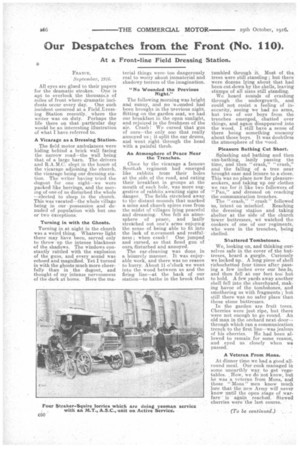Our Despatches from the Front (No. 110).
Page 16

If you've noticed an error in this article please click here to report it so we can fix it.
At a Front-line Field Dressing Station.
FRANCE,
• •
September, 1916.
All eyes are glued to their papers for the dramatic strokes. One is apt to overlook the thousant:s of miles of front where dramatic incidents occur every day. One such incident occurred at a Field:Gressing Station recently. where the writer was on duty. Perhaps the life there on that • particular day would be an interesting illustration of what r have referred to.
A Vicarage as a Dressing Station.
The field motor ambulances were hiding behind a brick wall facing the narrow road—the wall being that of a large barn. The drivers and R.A.M.C. slept in the house ot the vicarage adjoining the church, the vicarage being our dressing station. The writer having tried the dugout for one night—we were packed like herrings, and the moving of one of us disturbed the whole —elected to sleep in the church. This was vacated—the whole village being in our-possession and denuded of population with but one or two exceptions.
Turning in with the Ghosts.
Turning in at night in the church was a weird thing. Whatever light there may have been, served only to throw up the intense blackness of the shadows. The windows constantly rattled with the explosion of the guns, and every sound was echoed and magnified. Yet I turned in with the ghosts much more cheerfully than in the dugout, and thought of my intense nervousness of the dark at home. Here the ma
terial things weretoo dangerously real to worry about immaterial and shadowy terrors of the imagination.
"No Wounded the Previous Night."
The following morning was bright and sunny, and no -dtuarnded had been brought in the Drevious night. Sitting on the garden seat, we had our breakfast in the open sunlight, and rejoiced in the freshness of the air. Crash 1 We cursed that gun of ours—the only one that really annoyed us ; it split the ear drums, and went right through the head with a painful throb.
An Atmosphere ol Peace Near the Trenches.
Clot:e by the vicarage a famous Scottish regiment had emerged like rabbits trom their holes at the side of the road, and eating their breakfast in groups at the mouth of each hole, was more suggestive. of rabbits awaiting signs of danger. The fields stretched away to the distant mounds that marked a mine and church spires rose from the midst of villages lying peaceful and dreaming. One felt an atmosphere of peace, and lazily stretched out one's arms enjoying the sense of being able to fit into the lack of movement and restfulness; when crash ! One jumped and cursed, as that fiend gun of ours, disturbed and annoyed. The car-cleaning was done. in a leisurely manner. It was enjoyable work, and there was no reason to hurry. About 11 o'clock we went into the wood between us and the firing line—at the back of our station—to bathe in the brook that
tumbled through it. Most of Una trees were still standing ; but there were dozens lying about that had been cut down by the shells, leaving stumps of all sizes still standing.
We heard sounds of crashing through the undergrowth, and could not resist a feeling of insecurity, seeing we had no arms, but two of our boys froni the trenches emerged, chatted over things, and again disappeared into the wood. I still have a sense of there being something uncanny about those boys. It was doubtless the atmosphere of the wood.
Pleasure Bathing Cut Short.
Splashing and bathing and then sun-bathing, lazily passing the time, and then "crash," "crash," and the falling of a tree near brought ease and leisure to a close. This was no place now for pleasureseekers, and taking up our clothes we ran for it like two followers of "Pan," and dressed on reaching the communication trenches.
The "crash," " crash " followed
us, 'intent on mischief. Reaching the dressing station and taking shelter at the side of the church tower buttresses, we watched the cookers of one of our regiments, who were in the trenehes, being nhelled.
Shattered Tombstones.
We, looking on, and thinking our= selves safe in the cover of the -but treses, heard a gurgle. Curiously we locked up. A long piece of shell richochetted four times after pass• ing a few inches over our hea ds, and then fell at our feet to6 hot to hold. A few yards away another shell fell into the churchyard, making havoc of the tombstones, and smothering us with fragments ; but still there was no safer place than those stone buttresses.
In the garden are fruit trees. Cherries were just ripe, but there were not enough to go round. An old man in the orchard next door— through which ran a communication trench to the first line—was jealous of his cherries. He had been allowed to remain for some reason, and eyed us closely when we passed.
A Veteran From Mons.
At dinner time we had a good allround meal. Our cook managed ifs some unearthly way to get vegetables, How, we do not know, but he was a veteran from Mons, and those " Mons " men -know much lore that the new Army will never know until the open stage of waifare is again reached. Stewed cherries were the last course.
(To be continued.)






















